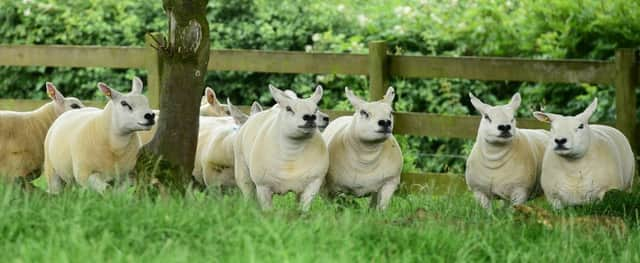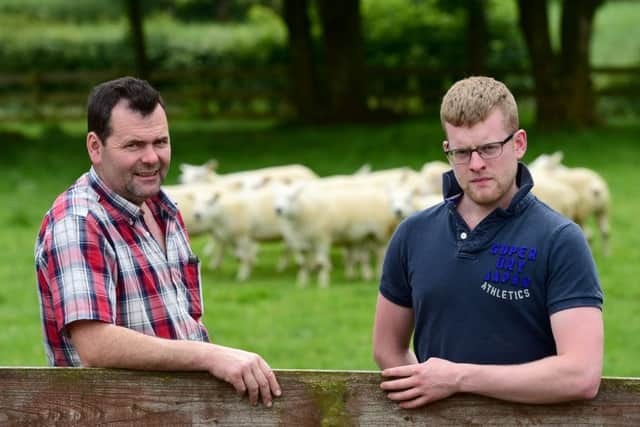Rohan Flock celebrates 10th anniversary milestone


“We’d always used Suffolks in the commercial flock, but I bought a Texel ram lamb from John Currie one year and was impressed with the lambs he produced. As a result of that I fancied buying a few ewes for myself and that’s how the Rohan flock was started.
“The intention really was just to breed a few rams to use ourselves, but as it happened we bred a decent ram lamb in our first year which we sold for 3,800gns. This was Rohan Lucky Dip, a Parkview Judge son out of a Tullagh gimmer by Carrowdore His Highness. It was a fantastic start for us and really gave me the bug to stick with it and progress with the pedigree side of things,” explains Danny.
Advertisement
Hide AdAdvertisement
Hide Ad“I’ve always looked for a commercial type of Texel with that extra bit of spark and breed character to breed the better sheep too. The first sire we bought was Tullagh Legend for 6,000gns at Lanark in 2006. He was a big spend for a young flock, but he proved his worth, leaving great females and also being the sire of Rowandale Rocky which we sold from my son Darren’s flock in 2010 for 14,000gns and of Rowandale Predator which sold for 2,600gns at Dungannon in 2009.”


As with any flock it is these solid foundations which have paved the way for the McKay family, with Danny commenting that the style and stamp from those initial Tullagh gimmers and Legend still show throughout the flock today.
“There’s no doubt about it we were lucky to start with such good genetics. It has paid dividends in the flock year after year and allowed us to bring in a variety of stock sires all of which have knitted well with the flock.
“Nowadays we’re looking to produce big, powerful tups that the commercial customer is after in order to produce top end prime lambs. We need a bit of size and stretch to suit our commercial buyers and they are after all the bread and butter of the sheep industry. Of course we like to breed a few lambs a year which catch the pedigree breeders’ eye, but these are the exception rather than the rule. They help keep our name out there in what can be a competitive market here in Northern Ireland.”
Advertisement
Hide AdAdvertisement
Hide AdWith this in mind current stock sire and 7,500gns purchase Knap Vital Spark was bought for his scope and power.


“He’s proven to be a great breeder in his first season and we’re hopeful his daughters will pass all of his attributes through to their progeny in due course.”
But, with a small flock of just 12 ewes there is a need to keep things moving and in order to achieve this Danny likes to push on with new genetics by flushing up to eight ewes a year.
“That may seem excessive for such a small flock, but I’d sooner keep a small number of high quality ewes and flush them as it allows us to move through the generations quicker and ensure we stay at the front of the pack.
Advertisement
Hide AdAdvertisement
Hide Ad“It is probably fair to say the flock changes completely every couple of years as we bring fresh gimmers in and sell on older proven ewes. There is a ready market for these proven ewes and often they go on to breed well for their new owners having done a good job for us too.”
Flushing also allows the McKays to sell a significant number of gimmers each year, with most years seeing between 75 and 90 lambs born in to the flock.
“In 2014 we flushed 97 embryos from six ewes with about 80 of these holding, so we’ve always got good numbers of females to pick from four ourselves as well as a good number to sell too.”
From the outset Danny hasn’t been afraid to bid well for the right tups, including buying a share in the 14,000gns Cherryvale Nijinsky a tup he says did exceptionally well at Rohan and left a lasting female legacy.
Advertisement
Hide AdAdvertisement
Hide AdHe says: “We’ve still got ewes in the flock by him now and they continue to breed the right type of sheep by a variety of sires. This focus on buying good sires also means we don’t use semen from other rams.
“I’d always rather own the tup than buy a bit of semen from here or there. It means we can keep some level of control over things and gives us the chance to buy a ram to suit our own females. Despite flushing so heavily we still need a tup to use naturally too and I’d rather it was a decent tup rather than one just bought as a sweeper,” he adds.
Danny does though question whether flushing is the right route for the flock in the long-term.
“It’s a really tricky one, at the moment we’re getting the rewards from it, but there’s no doubt that with the amount of flushing being done in Northern Ireland now the market is becoming more and more competitive. It might be that in time we increase our numbers and go away from flushing.
Advertisement
Hide AdAdvertisement
Hide Ad“To justify the expense of it you really need to be selling a few decent priced lambs a year. If we went to a larger flock and cut the flushing we’d be able to perhaps cull harder than we might like to at the moment.”
The flock lambs in February with ewes housed about a fortnight before lambing and then turned back out to grass as soon as the weather allows.
“We’re lucky to have plenty of grass at hand for the ewes and lambs receive creep feed from early on in order to help them get a good start. We only show at Balmoral normally, but that’s early in the season, so we need our lambs to be thriving from the minute they are born to make a mark there.”
With the Rohan flock now passing its tenth anniversary Danny feels it has hit maturity, with Rohan and Rowandale tups breeding well for their purchasers and the flock recognised as one selected for correctness and fleshing. “These are the vital attributes we mustn’t forget. Keeping breed character is important and would be hard to breed back in if we lost it, but locomotion and correct feet and legs are equally paramount for me and our commercial customers want rams with carcass and growth.
Advertisement
Hide AdAdvertisement
Hide Ad“As with any flock there is always room for improvement, but its pleasing to see our sheep performing well for others and repeat customers for both rams and gimmers are a sure sign we’re getting things about right,” he adds.